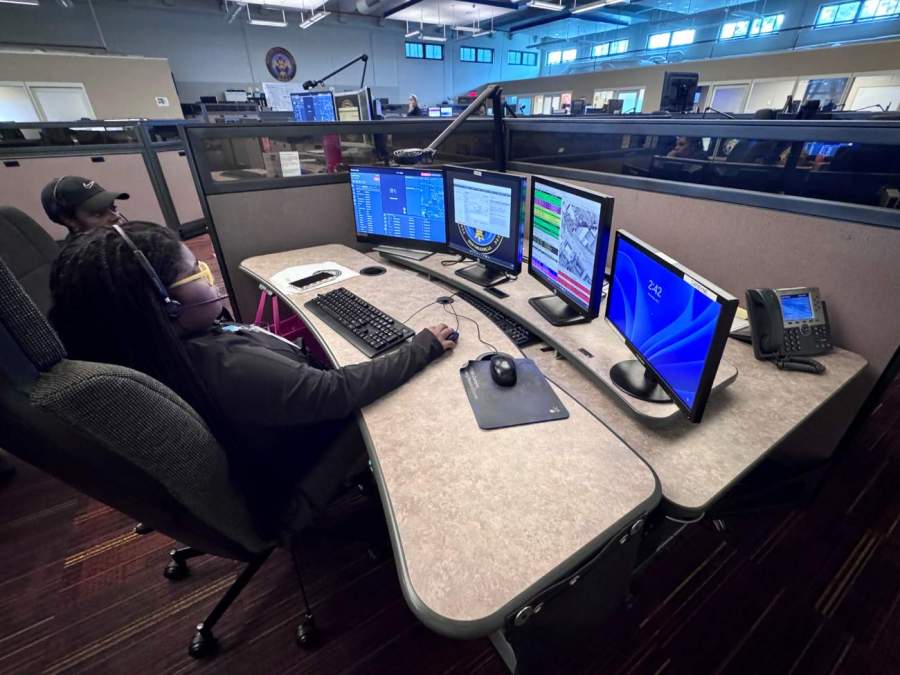New Orleans 911 is triaging emergency calls with AI

As emergency communications centers around the country struggle to hire enough people to field calls, a new AI-powered service for triaging incoming 911 calls is hoped to offer at least some relief.
The Orleans Parish Communication District, which administers 911 service for the City of New Orleans, is the first in the country to use Call Triage, new software from the public safety technology firm Carbyne.
Karl Fasold, executive director of the district’s emergency communications center, told StateScoop he’s been testing the tool over the past four months to see if it can reduce the number of calls forwarded to his understaffed team. He said his center currently employs about 140 people for various jobs, but that he’s short 18 call takers, despite “continual” recruiting over the past year.
Carbyne’s tool connects to the district’s computer-aided dispatch system to see ongoing incidents. If new callers are within 100 meters of an incident marked for triage, they’re first asked by an automated system if they’re calling about that incident and whether they were involved. In most cases, callers are not involved and are simply reporting information the center already has, in which case they’re told they may hang up. Otherwise, they’re connected with human call takers, as usual.
Orleans Parish is currently only using the new function for motor vehicle accidents and only for one incident at a time. But Fasold said he’s ready to begin using it for multiple incidents and next he wants to use it for other nonviolent incident types.
He estimated that the AI’s ability to divert redundant 911 calls will equate to the work of two full-time staff members, a healthy boost to the 8-10 human call takers who work a given shift in Orleans Parish.
“Everywhere in the country, 911 centers are short of personnel,” Fasold said. “There is a staffing crisis in our industry. I have roughly a third of my call-taking positions budgeted, authorized, unfilled.”
Survey results published by Carbyne and the National Emergency Number Association in April show that vacant positions are the top challenge for many emergency call centers. Eighty-two percent of centers reported chronic staffing shortages, a trend sometimes attributed to the job’s high level of stress.
Emergency call centers strive to meet national benchmarks for speed. One standard set by the National Emergency Number Association requires centers to respond to 90% of their calls within 15 seconds. Fasold said his center briefly met that standard last year when a former director required, for four months, for its staff to work mandatory overtime. He said that ended when people started quitting.
“I made the decision that I was not going to burn out any more of my people, so we went to providing optional or voluntary overtime if people wanted to do it,” he said. “Even now, it’s not enough to make a big difference, so we are hanging in the 70-80% margin [for the 15-second standard].”
NENA further encourages centers to answer 95% of their calls within 20 seconds. Fasold said 911 callers in New Orleans won’t have to wait more than a minute, but waits of 30-45 seconds are possible during peak hours. For most calls, a few extra seconds won’t matter, Fasold admitted, but sometimes they’ll mean everything.
“I believe we should not have any unnecessary delays. For the [calls] that it is important, we don’t know which calls they are, so it’s important,” he said. “We’re doing our best to meet [the standards] but we can’t meet them by hiring enough people at this point.”
Fasold said he’s hopeful about the ability of AI to help plug a gap in his operations that he’s been unable to meet despite his best efforts. Beyond call triaging, Fasold said he’s also experimenting with using AI to speed up calls with human call takers, but added that it’s “really in an alpha environment so all I can do is hint at it.”
Like many other government functions, emergency management is primed for disruption by advances in generative AI. Some 911 call centers have begun using AI to translate foreign languages on the fly, rather than waiting for sluggish human translation services to become available. Others are using AI to help route calls to the correct responding agency, to analyze calls and to generate data analytics reports.
The public safety tech integrator Mission Critical Partners last month announced a new deal with Amazon Web Services to make the Amazon Connect cloud contact center service available to 911 centers looking to triage their administrative calls.



